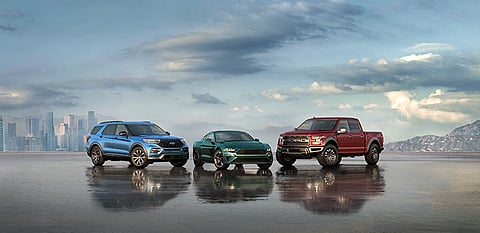
- NEWS
- the EDIT
- COMMENTARY
- BUSINESS
- LIFE
- SHOW
- ACTION
- GLOBAL GOALS
- SNAPS
- DYARYO TIRADA
- MORE

Several leading automakers, including General Motors and Ford, reported increased U.S. car sales in the second quarter Tuesday as consumers accelerated purchases ahead of U.S. tariffs.
Sales were particularly strong early in the quarter amid expectations of tariffs from President Donald Trump. Japanese automakers Toyota and Honda, along with South Korean brands Kia and Hyundai, also reported sales gains compared with the same period last year.
“They were able to capitalize on the tariff-induced fear and that drove sales, especially in the early part of the quarter,” said Garrett Nelson, equity analyst at CFRA Research.
Despite the tariffs, consumers have yet to face significant price increases because companies have relied on inventories imported before tariffs took effect. Prices are expected to rise more in the second half of 2025, though market forces may limit hikes.
GM reported a 7.3 percent increase in vehicle deliveries to 746,588, driven by strong sales of pickup trucks and SUVs as well as affordable models like the Chevrolet Equinox and Chevrolet Trax, the latter imported from South Korea.
Ford saw a 14.2 percent jump to 612,095 vehicles, boosted by a program offering customers employee pricing on many models. Most of Ford’s top vehicles, including the F-series pickup and Explorer SUV, posted higher sales. Sales of its all-electric F-150 Lightning and Mustang Mach-E were lower, but hybrid vehicle sales jumped.
Toyota sales rose 7.2 percent to 666,470, with double-digit gains in models such as the Camry sedan and Tacoma pickup. Honda, Kia, and Hyundai posted increases between five and 10 percent.
Nissan’s sales dropped 6.5 percent to 221,441, while Jeep-owner Stellantis was projected to have a 12.8 percent decline to just over 300,000 vehicles.
The U.S. imposed 25 percent tariffs on imported finished cars in early April and on imported auto parts in early May. White House officials allowed a two-year grace period on parts and prevented duplicative tariffs on steel and aluminum.
Cox Automotive Chief Economist Jonathan Smoke said last week that “we don't think consumers or fleet buyers are able and willing to accept that added cost,” projecting an eight percent price increase due to tariffs. He noted uncertainty about the economy and Federal Reserve interest rate cuts could cause buyers to delay purchases.
Nelson added, “Things have cooled off from where they were at the beginning of the quarter. Everything we're seeing suggests that consumers are still very price sensitive.”
